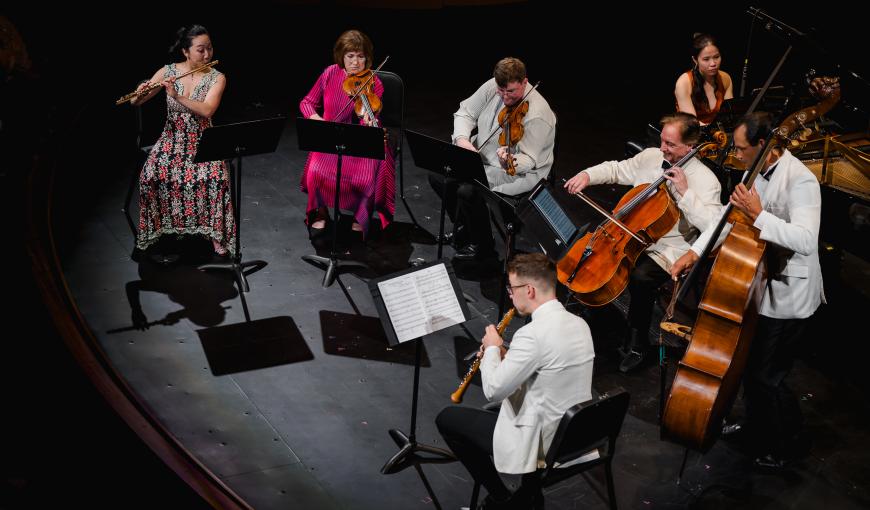
Joyeux vingt-deuxième anniversaire, Musique@Menlo !
We may as well greet Music@Menlo’s 22nd season in French because it’s called “French Reflections” and will cover French music over the centuries, from Baroque masterpieces through impressionism, as well as songs in different languages, trios from contrasting traditions, and “some of the finest piano music ever written,” according to the season announcement.
“Reflections” refers to the innovations of French composers and their effect on composers around the world, from Mozart to Bohuslav Martinů.
The topical programming follows Music@Menlo’s tradition of devoting full seasons to subjects such as Russian music (2016) or works by Beethoven (2005 and 2023), Mozart (2006), Felix Mendelssohn (2009), Antonín Dvořák (2014), and Franz Schubert (2015).
No justification is needed for focusing on French music, but Artistic Directors Wu Han and David Finckel told SF Classical Voice their reasons:
“Music@Menlo has always focused its festivals around perspectives on music, different lenses through which we can look at the vast art form of chamber music. This helps listeners focus, gain knowledge of the art form, and ultimately come away feeling that they know quite a bit more about chamber music than before the festival.
“With more than two decades of history, Music@Menlo has delved into many aspects of chamber music, from its composers to historical periods and even instrumental elements (‘The Glorious Violin,’ 2017). Any country, city, or region rich in chamber music history has been extensively featured so far, except France.
“We are very excited to have collected such a wide range of familiar French chamber music and amazing new discoveries, spanning centuries. In addition, we are featuring the inimitable French piano and vocal repertoire. Moreover, all the French music we play this summer will be juxtaposed with music of similar form or purpose from other cultures, thereby intensifying the French music experience through contrast and parallels.”
Running July 19 – Aug. 10, the festival will present over 50 events across Music@Menlo’s three stages in Atherton.
The season announcement coincides with the news that the festival’s 20th-Anniversary Campaign, launched in 2022, has now raised $5.75 million in support of the organization’s education programs, artistic initiatives, and digital infrastructure.
The funds have already been applied to such Music@Menlo projects as commissions from composers Wang Jie and David Serkin Ludwig, expanded residency and training programs for early-career musicians, and a newly tuition-free (and newly named) Smith Family Young Performers Program.
Wu Han said, “The Chamber Music Institute is the crown jewel of our festival, and the generosity of our community and of our board will change the lives of countless young musicians. These young people, in turn, will change the course of chamber music itself.”
Music@Menlo’s consistent record of presenting prominent chamber musicians from around the world holds true for its 22nd season, with a roster of 44 artists this year, 13 of whom — marked with an asterisk below — will be making their festival mainstage debuts:
Pianists Jean-Efflam Bavouzet*, Michael Stephen Brown, Anna Geniushene*, Gilbert Kalish, Ken Noda, Hyeyeon Park, Orli Shaham, Chelsea Wang*, and Wu Han; harpsichordist Kenneth Weiss
Violinists Benjamin Beilman, Stella Chen, Francisco Fullana, Chad Hoopes, Paul Huang, Kristin Lee, and Lun Li; violinist/violists Sunmi Chang and James Thompson; violists Matthew Lipman, Paul Neubauer, and Masumi Per Rostad
Cellists Dmitri Atapine, David Finckel, Sterling Elliott, Sihao He, and David Requiro; bassist Nina Bernat; harpist Bridget Kibbey; the Viano String Quartet (violinists Lucy Wang and Hao Zhou, violist Aiden Kane, and cellist Tate Zawadiuk)
Clarinetists Jose Franch-Ballester and Tommaso Lonquich; flutist Sooyun Kim; bassoonist Peter Kolkay; oboist James Austin Smith; horn player David Byrd-Marrow*; trumpet player David Washburn; soprano Erika Baikoff; “Encounter” leaders Juliette de Marcellus*, David Serkin Ludwig, and Michael Parloff
Among the main concert programs:
Program I, opening the season on July 20, is “Baroque Tableau,” presenting music by Georg Philipp Telemann, Dieterich Buxtehude, J.S. Bach, François Couperin, Jean-Philippe Rameau, and Jean-Féry Rebel.
Program II moves “Vienna to Paris,” with music of Haydn, Mozart, Gabriel Fauré, Jean Françaix, and Maurice Ravel.
The next two programs are “instrument-oriented”: “Quartets and Harps,” with works by Ravel, Samuel Barber, and Charles Martin Loeffler, and “Trios and Trumpets,” with trios by Mozart and Cécile Chaminade, Bohuslav Martinů’s La revue de cuisine, and (we’re counting liberally) Camille Saint-Saëns’s Septet in E-flat Major — twice a trio plus one.
Program V is called “Piano/Piano,” featuring works by Fauré, Anton Arensky, Claude Debussy, and Sergei Rachmaninoff. Program VI is “Vocal Exchange,” with a broad representation of instruments standing in for the “voice” in pieces by Rachmaninoff, Alexander Scriabin, Anton Rubinstein, Franz Liszt, and Joaquín Turina. The concluding Program VII, on Aug. 8 and 10, is “Renascence.”
At the Chamber Music Institute, the Young Performers Program (ages 10–19) runs July 19 – Aug. 10, with Dmitri Atapine and Hyeyeon Park as co-directors. The International Program (ages 20–30) runs July 15 – Aug. 10, with Gilbert Kalish and Kristin Lee as co-directors.
